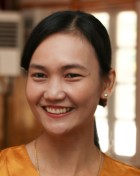Participants engaged in group activities and reported back to the bigger group.
Many people may say they understand the concept of gender, but the question is, do they really? Gender may mean different things to different people, as I discovered last month when I delivered training on gender to senior Government Officials the Central Institute of Civil Service (CICS) for Upper Myanmar, located in Pyin OoLwin, and for Lower Myanmar, located in Phaung Gyi.
While all participants (approximately 65 were men in 91 participants!) knew about the biological differences between men and women, few were able to articulate why and how this mattered.
One of the participant, a female researcher from the Yezin Agricultural University, confided that when she went into the community to conduct a research on gender and agriculture, many of the men and women she spoke to, could say how equal participation could improve their lives, but when she dug deeper, it was clear the women were excluded from decision making.
In a country where, 70 percent of its population is rural, and 51% overall are women, this is a serious issue that needs to be addressed.
As I went about conducting the training, I made sure to emphasis how and why women should be included in decision making. There is only one female minister among 18 ministries at the Union level: it is clear that more women needed at the decision making level.
Myanmar, not just being as a signatory of Convention on the Elimination of all forms of Discrimination against Women (CEDAW) but also as a country which has a National Strategic Plan for the Advancement of Women (NSPAW), affirmative actions are needed for gender equality and women’s empowerment.
Referring to the Myanmar’s commitment on gender equality and women’s empowerment, I continued the session for CEDAW background information, the Structure and three main principles of CEDAW: Substantive Equality, Non-Discrimination and State Obligation. Then group work activities were conducted for the understanding of women’s rights as mentioned in CEDAW articles 1-16. Participants enjoyed matching the CEDAW articles to the images I had provided. They understood that women’s rights in CEDAW articles are also the human’s rights that needed to be fulfilled worldwide.
After the session on CEDAW, I continued onto the National Strategic Plan for the Advancement of Women (NSPAW) which is based on the 12 Priority Areas of the Beijing Platform for Action and CEDAW.
When I asked to the participants their knowledge of NSPAW, they admitted they were not aware of it. Therefore, I started with the background information, NSPAW’s four strategies and how it linked to the Myanmar’s commitment to CEDAW implementation. Group discussions were held for the implementation of NSPAW. Four groups were organized and each group identified one of the implementing areas from NSPAW’s 12 key priority areas - Women and Livelihoods, Women, Education and Training, Women and Health, Violence Against Women, Women and Emergencies, Women and the Economy, Women and Decision-Making, Institutional Mechanisms for the Advancement of Women, Women and Human Rights, Women and the Media, Women and the Environment and the Girl Child. The groups discussed the activities its members were currently implementing, future plans and challenges. Through the presentations its was clear that while many participants had claimed to be ignorant about NSPAW, their departments were indeed implementing activities along the 12 priority areas of NSPAW.
Participants at both events appreciated UNDP’s efforts to provide training on gender and they were eager to coordinate with UNDP for future plans and activities relating to Gender Equality and Women’s Empowerment in their respective Department/ Ministries.
About the Author
Khet Khet Shein is the Gender Analyst for UNDP Country Office in Myanmar. She provides technical advice for the mainstreaming of gender in the programmes and projects which are run by UNDP. She is works closely with government ministries to support Gender Equality and Women’s Empowerment. Prior to this holding this position, Khet Khet worked as a National Coordinator for May Doe Kabar National Network of Rural Women which is comprised with 20,000 of rural women across Myanmar. She also has more than 9 years of work experience as an assistant director in the Department of Social Welfare, Relief and Resettlement under the Ministry of Social Welfare, Relief and Resettlement. She holds a Master Degree of Gender and Development Studies from Asian Institute of Technology.

 Locations
Locations

